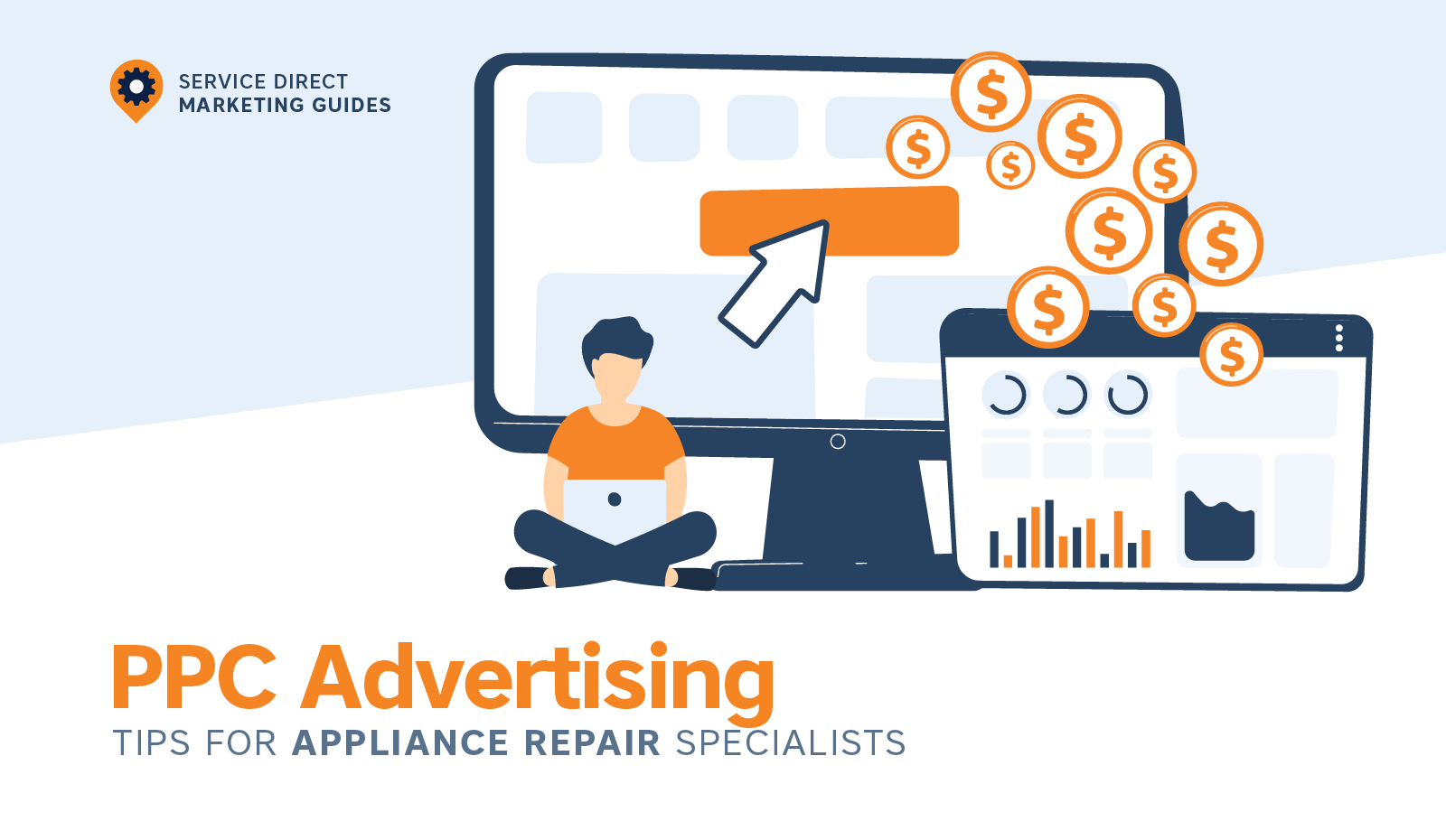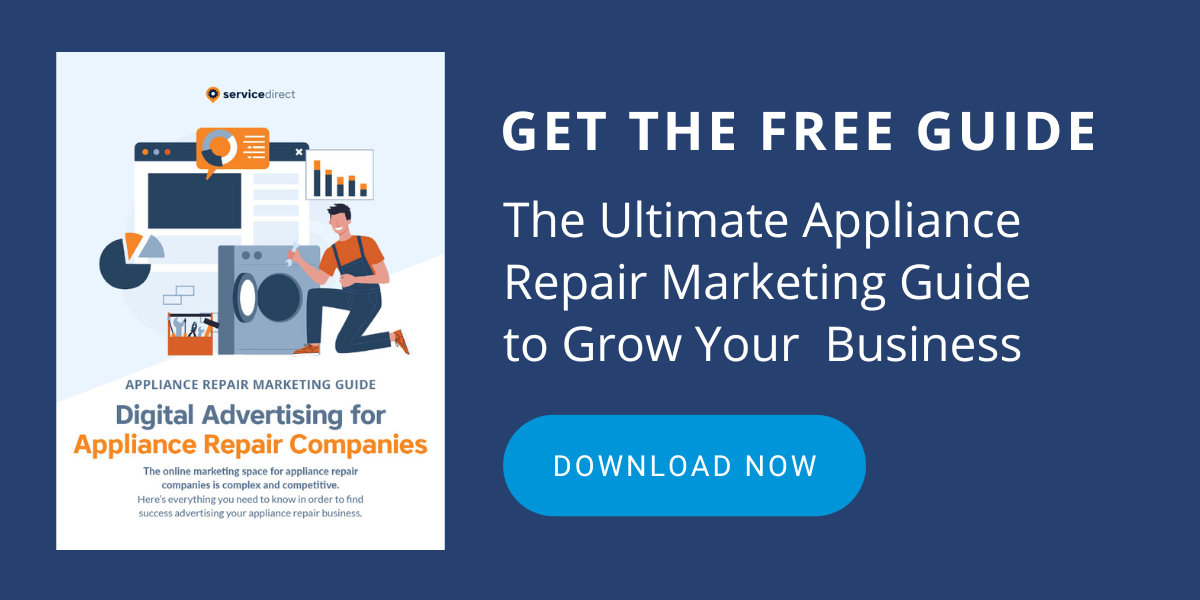PPC Advertising Tips for Appliance Repair Specialists
As an appliance repair specialist, you know that leads are the lifeblood of your business. You need to find new customers and convert them into clients as quickly as possible.
Pay-per-click (PPC) advertising is a great way to get in front of potential customers who are actively searching for your services online. In fact, 87% of marketers reported that paid search advertising is an effective part of their overall marketing efforts.
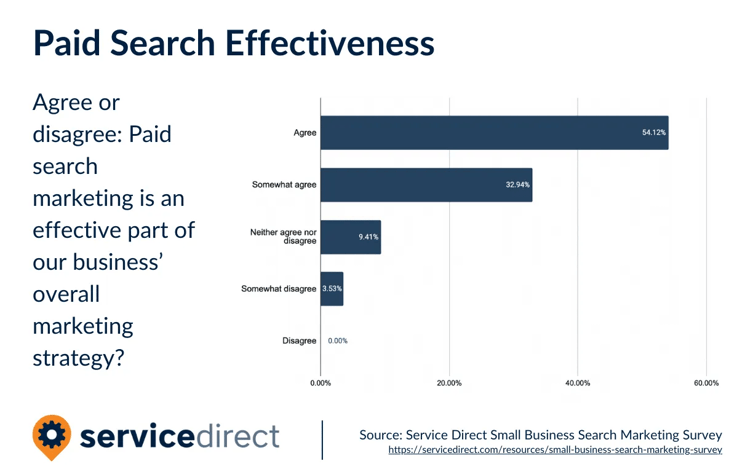
This blog post will provide tips on how to use PPC to drive more leads to your business. We'll highlight the importance of keywords, using tracking and reporting to optimize campaigns, and building landing pages and CTAs designed to convert!
Start With Appliance Repair Keywords
When it comes to PPC advertising, keywords are essential.
They are the terms and phrases that you bid on in order to have your ad appear in search results. In other words, they are what connect your business with potential customers who are searching for what you have to offer.
It's essential that you have a strategy in place for PPC that includes keyword planning, especially with 32% of businesses listing that as their biggest challenge.
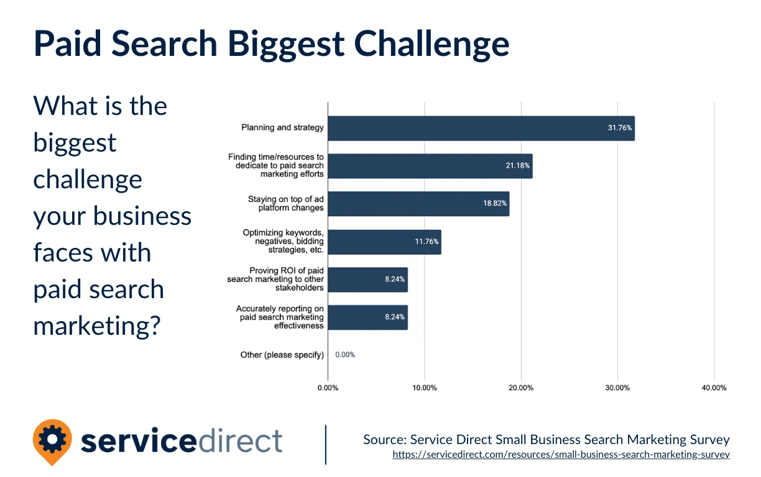
If you choose keywords that are too general, you will have a lot of competition and it will be challenging to stand out. On the other hand, if you choose keywords that are too specific, you may get very few clicks.
Researching and choosing the right keywords can be frustrating, but it is an essential part of any successful PPC campaign.
How to Choose the Right Keywords for Your PPC Ads?
With millions of potential keywords to choose from, how can you narrow down the field? Here are a few tips to help you select the right keywords for your appliance repair PPC campaigns:
- First, think about the terms that your target audience is likely to use when searching for your products or services. What terms are they using to find products or services like yours?
- Second, consider the difficulty of ranking for a particular keyword. If you're just starting out, it's probably best to avoid highly competitive keywords and focus on long-tail keywords instead.
- Third, make sure to track your progress over time. By regularly checking your progress, you'll be able to see which keywords are eating up your budget with little to show for it.
By following these tips, you can begin to choose the right keywords for your website.
Google Keyword Planner to the Rescue
Google Keyword Planner is a free tool that allows you to find the right keywords for your appliance repair PPC campaigns and provides data on how much traffic those keywords are getting.
You can use this tool to research which keywords are most valuable to your business so that you can bid more aggressively for those terms. It will even suggest bid amounts for different keywords to help you stick to your budget.
Simply enter a few details about your topic, and the keyword planner will generate a list of related keywords. You can then use this list to create targeted PPC ads.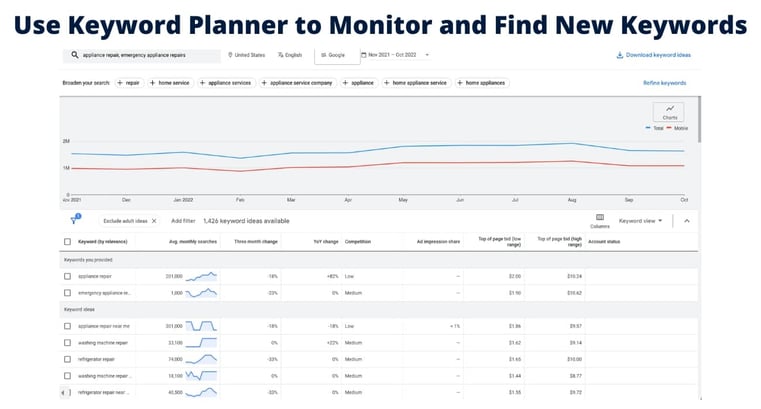
Establishing a PPC Budget and Sticking to it
The biggest mistake that many small businesses make is overspending on ad campaigns at the beginning when they don't have a set budget. In order to avoid this, it's crucial that you establish a PPC budget and stick to it.
By setting a limit on how much you are willing to spend per day, week, or month, you can control your costs and avoid blowing your entire marketing budget on a single campaign.
Additionally, a PPC budget can help to keep your campaigns organized and focused, as you will need to carefully consider each individual click when making budgetary decisions.
Google Smart Bidding
If you're feeling overwhelmed by the idea of managing a PPC budget for your appliance repair campaigns, Google Smart Bidding is the tool for you.
This automated tool uses machine learning to optimize your ad campaigns for conversions or sales, which can save you money.
Using data from your past campaigns, Google Smart Bidding can predict when a searcher is more likely to convert and adjust your bids accordingly.
The goal of Smart Bidding is to help you get the most out of your ad spend by getting your ads in front of people who are most likely to take the desired action.
While Smart Bidding can be very effective, it's important to keep in mind that it's not a magic bullet. Like any tool, it should be used as part of a holistic approach to running a successful ad campaign.
Negative Keywords Are Crucial
Negative keywords are a vital part of your appliance repair PPC campaigns.
By adding negative keywords to your campaigns, you can help to ensure that your ads are only shown to people who are likely to be interested in what you're selling. This helps improve your click-through rate (CTR) and reduces your cost per click (CPC).
When adding negative keywords, it's important to consider both the intent of the searcher and the context of the search.
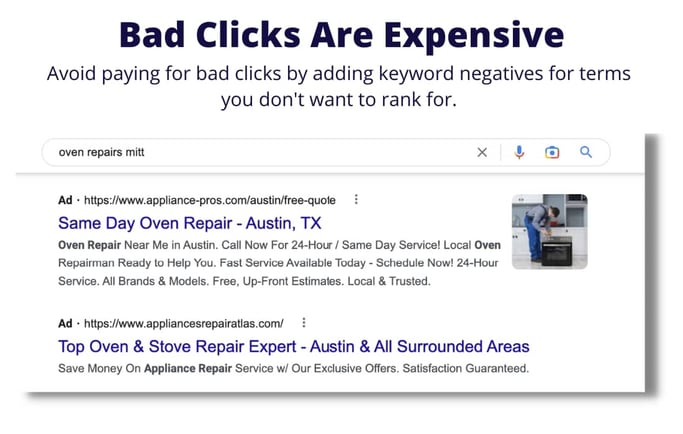
For example, if you're advertising oven repair, you might want to add the negative keyword "mitt" to your ad group so that you won't pay for clicks from people searching for oven mitt sales or repairs.
This helps ensure that your ads are only shown to people who are specifically searching for oven repairs.
By adding negative keywords to your PPC campaigns, you can help to improve your ROI and target your ads more effectively.
The Importance of PPC Tracking and Reporting
By tracking and reporting on your appliance repair PPC campaigns, you can identify key metrics, such as which keywords are performing well, which ad copy is most effective, and which landing pages are converting the most visitors.
Additionally, PPC tracking and reporting can help you to determine your ROI and make necessary adjustments to your campaigns in order to maximize your profits.
Start With Conversion Tracking
Conversion tracking is a Google Analytics feature that allows you to track how often users take a desired action after viewing your PPC ad.
This might include tracking the number of people who click on an ad and call your number or measuring the percentage of people who fill out a form for services after clicking your appliance repair ad.
By understanding which campaigns are generating conversions, you can fine-tune your PPC strategy and ensure that your hard-earned marketing dollars are being well spent.
Follow Through With Quality Score
Quality Score is a metric used by Google to measure the quality and relevancy of your keywords and landing pages.
A high quality score means that your ad is relevant and valuable to users, which in turn leads to a higher ad rank and lower CPC. Conversely, a low quality score can result in a lower ad rank and higher CPC.
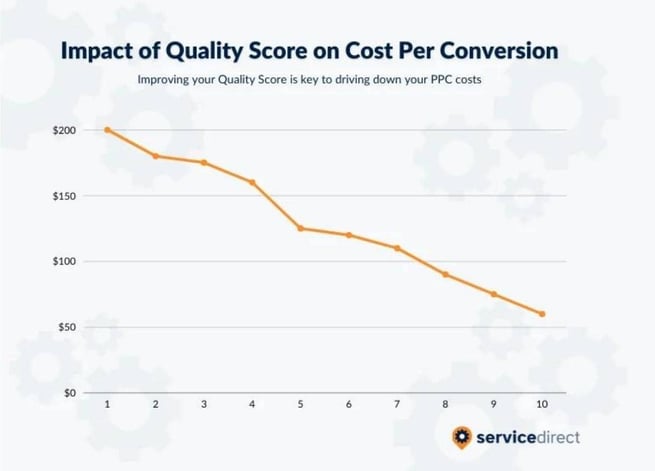 Service Direct results based on PPC campaigns we run for our in-house appliance repair traffic
Service Direct results based on PPC campaigns we run for our in-house appliance repair traffic
Because of that, it's important to keep an eye on your ad's Quality Score and work to improve it by ensuring your landing pages are designed to convert.
It's important to remember that while Quality Score is an important metric to use to gauge ad performance, it shouldn't be your single source of truth. We recommend using conversion tracking in tandem with Quality Score to see the most success!
Ensure Your Website Encourages Conversion
Having a high-quality website that encourages conversion is crucial to seeing success with PPC campaigns. What is all the work for if someone clicks your ad and is directed to a low-quality site, after all?
Your website needs to be well-designed, user-friendly, and informative in order to persuade visitors to take the desired action. In other words, your appliance repair website needs to be a conversion machine.
Content and CTAs and Their Role in Conversion
Your appliance repair website's content is key to attracting and converting visitors.
It needs to be high-quality, interesting, and relevant to your audience. In addition, your content must be optimized for conversion.
This means including calls to action (CTAs) that encourage visitors to take the next step, whether it's calling your number, filling out a service form, or making a purchase.
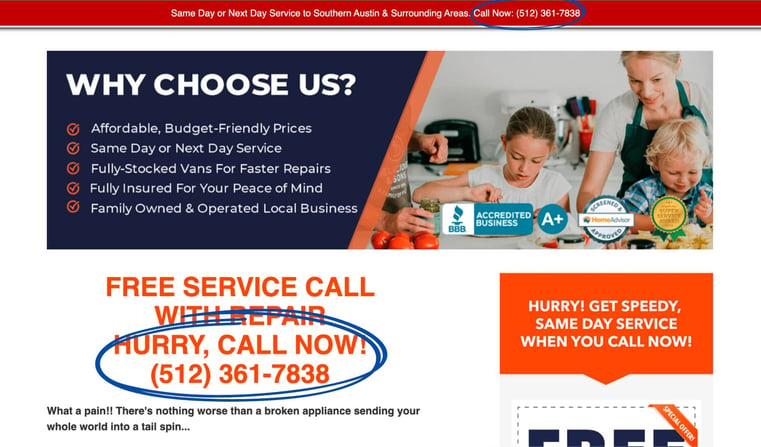
Source: southern-austin-appliance.net
By ensuring that your content is of the highest quality and effectively promotes your CTAs, you can maximize your chances of turning website visitors into loyal customers.
Create Landing Pages Dedicated to Your PPC Ads
Another important way to encourage conversions on your website is to create service-specific landing pages for your PPC ads. In fact, we found that 86% of small businesses deploy dedicated landing pages exclusively for their paid search traffic.
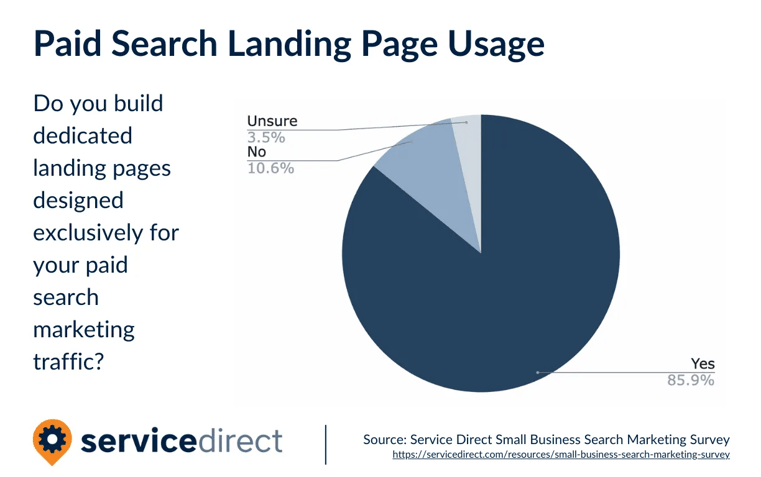
A service-specific landing page is a page on your website that is designed specifically for the customer who clicks on your ad.
This page should contain all of the information that the customer needs in order to make a purchase, such as contact information, product details, and a call to action.
By providing all of this information on a single page, you can greatly increase the likelihood that the customer will convert.
Additionally, by making the process of converting as easy as possible, you will encourage more customers to click on your ads in the future.
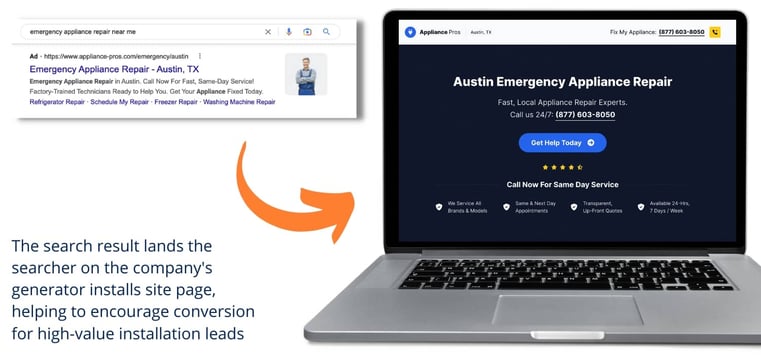 Source: appliance-pros.com
Source: appliance-pros.com
Focus on Site Performance
In order for your PPC campaigns to be successful, potential customers must be able to click on your ads and then quickly and easily navigate your website.
If your website is slow to load, not secure, or not optimized for mobile, you will likely see a high rate of "bounce backs," where customers click away from your site without taking any action.
This not only wastes your advertising budget, but it also hurts your chances of appearing in future search results.
Therefore, it is important to make sure that your website is properly optimized for speed and usability before you launch a PPC campaign.
By doing so, you can help ensure that your campaigns are successful and that potential customers have a positive experience when they visit your site, further encouraging conversion.
Conclusion
Now that you understand the basics of appliance repair PPC advertising, it’s time to focus on your campaigns and driving quality leads that convert into customers.
Remember to keep an eye on your keyword ranking and spending, track your results with reporting tools, and make sure your website is optimized for lead conversion.
If you need more help getting started, check out our comprehensive guide to marketing for appliance repair businesses. This in-depth resource covers everything from SEO to email marketing and beyond.

